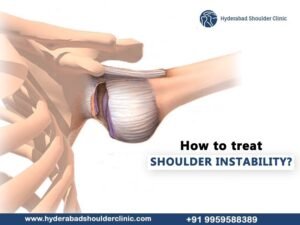Shoulder pain is a common problem faced by many people nowadays. Nearly one in every three people are affected by Shoulder injuries. Doctors say that they observed most people complaining about shoulder pain is due to rotator cuff problems. A rotator cuff is a group of muscles that support your shoulder joint.
When we suffer from shoulder pain, our first move might be taking our own medications like ibuprofen or other pain relievers. But prolonged use of NSAIDs has many side effects which include gastrointestinal bleeding, kidney problems, and cardiac diseases.
Doctors say that most of the patients with shoulder pain ask them when to opt for rotator cuff surgery. There are many factors we need to consider before choosing the surgical intervention. Age, overall health, the severity of the problem are the things mostly considered.
So let us know common rotator cuff injuries so that we can get to know when we need to choose a surgical intervention.

Common Rotator Cuff Injuries
Muscles and tendons of the rotator cuff are vulnerable to rotator cuff tears. The injuries vary from mild tendon inflammation to partial and severe rotator cuff tears, which might require a rotator cuff surgery to treat the injury.
Some common shoulder rotator cuff injuries include:
Rotator Cuff Impingement
Shoulder impingement syndrome, it is a very painful condition where your Shoulder’s rotator cuff tendons are trapped occasionally and compressed during the elevation of Shoulder. Persisting shoulder impingement might result in shoulder bursitis or structural injuries to rotator cuff tendons such as rotator cuff tendinopathy or a rotator cuff tear.
Treatment for Shoulder Impingement
The treatment is based on the structures that has injury in rotator cuff impingement. Since each structure requires distinct treatment option.

It is important to understand why the impingement has occurred, before taking treatment for shoulder impingements. Some impingements can be treated in one or two treatment sessions. Some cases might take a few weeks or months to recover, and other complicated cases may require shoulder surgery.
Rotator Cuff Tendonitis / Tendinopathy
Inflammation may not always be present in the injuries of the tendon. Chronic tendon injuries, which is a full-spectrum of shoulder tendon injuries, are termed as shoulder tendinopathy.
Treatment for Shoulder tendinopathy
Often, shoulder tendinopathy co-exists with shoulder bursitis or bicipital tendonitis. It can be progressive and turns into calcific tendonitis or rotator cuff tears. Surgical intervention is required in severe conditions. Thankfully, most shoulder tendinopathies are successfully treated.
Shoulder Bursitis
Shoulder bursitis is caused due to inflammation of shoulder bursa. The shoulder bursa is a sac filled with fluid that helps in the reduction of friction in the shoulder spaces. Several bursae are present within your Shoulder. The most commonly inflamed shoulder bursa is subacromial bursa.

Treatment for Shoulder Bursitis
If shoulder bursitis is not treated correctly, it becomes chronic and difficult to treat, which results in a cycle of rotator cuff injuries and shoulder impingement.
Over time it may result in calcific bursitis (bone growth within the bursa). If physiotherapy rehabilitation is not successful, such conditions, surgical excision of the bursa can be helpful to treat these instances.
Calcific Tendonitis
Calcific tendonitis is a condition where a small calcium deposit of size about 1-2 cm are formed within the tendons of the rotator cuff. Usually, these deposits are seen in patients of age between 30-40 years and have a higher prevalence in people with diabetes. The calcium deposits often don’t cause pain, even if they are painful, they will resolve within weeks.

Treatment for Calcific Tendonitis
Usually, calcific tendonitis progresses typically and mostly resolves without surgery. Researchers say that there are 7 essential stages to rehabilitate these injuries effectively and prevent a recurrence.
Rotator Cuff Tears
A rotator cuff tear is a tear of the rotator cuff tendons within your Shoulder. A rotator cuff tear occurs due to trauma and repeated microtrauma.
Treatment for Rotator Cuff Tears
Small and mild rotator cuff tears can be healed with appropriate conservative management and physiotherapy treatment. Generally. Physiotherapy is the first treatment option suggested by any doctor for rotator cuff tear.

However, when physiotherapy treatment fails to assist severe rotator cuff tears, they can be treated through rotator cuff surgeries like arthroscopic or open surgery. Shoulder replacement or reverse shoulder arthroplasty is performed in the case of massive rotator cuff tears to restore some lost shoulder functions.
Bicipital Tendonitis
Biceps tendinopathy is the inflammation of biceps tendon that passes through the bicipital groove and around the head of the biceps muscle.
Biceps tendinopathy injuries are of different types:
- Biceps tendonitis/tendinitis – inflamed tendon.
- Biceps tendinosis – non-inflamed degenerative tendon
- Biceps tenosynovitis – inflamed tendon sheath
- Ruptured biceps tendon – degeneration or tear

Treatment for Bicipital Tendonitis
Bicipital tendinopathies can be successfully treated through physiotherapist-guided rehabilitation sessions. Some severe biceps tendon ruptures require surgical intervention. However, even severe cases of biceps tendon ruptures also doesn’t require surgery, and can be rehabilitated to resume lost shoulder function.
Overview of rotator cuff injury treatment
As we discussed above most of the cuff injuries can be managed through conservative treatments like ice, rest and physical therapy.
If conservative treatments aren’t effective enough to reduce your pain, then steroid injection is injected into your Shoulder joint, especially if the pain is delegating and interfering in your daily activities.
If the muscle or tendon involves a complete tear, then you might need surgery. There are different types of surgeries available for treating rotator cuff injuries, which include:
- Arthroscopic tendon repair
- Open tendon repair
- Tendon transfer
- Shoulder replacement
Early diagnosis and treatment is the best way to treat rotator cuff injuries. If you neglect rotator cuff injuries, they might become chronic and can cause severe complications. If you feel any discomfort with your Shoulder, consult Dr Chandra Sekhar, one of the best orthopaedician in Hyderabad for better treatment suggestions.





